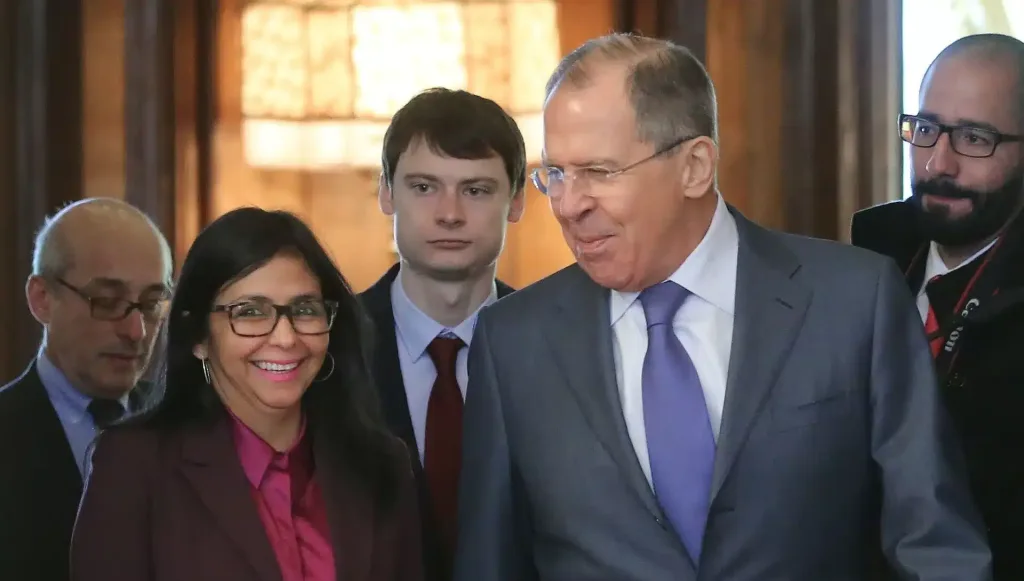
Former Venezuelan Foreign Minister and current Vice President Delcy Rodríguez meets with her Russian counterpart Sergey Lavrov in Moscow in 2017. Photo: Vitaliy Belousov/Sputnik/File photo.

Orinoco Tribune – News and opinion pieces about Venezuela and beyond
From Venezuela and made by Venezuelan Chavistas

Former Venezuelan Foreign Minister and current Vice President Delcy Rodríguez meets with her Russian counterpart Sergey Lavrov in Moscow in 2017. Photo: Vitaliy Belousov/Sputnik/File photo.
Russian Foreign Minister Sergey Lavrov expressed his country’s unequivocal support for the Venezuelan government and President Nicolás Maduro in the face of growing US threats during a telephone conversation with Vice President Delcy Rodríguez on Friday. He made it clear that his country supports the efforts of the homeland of Bolívar and Chávez “to defend national sovereignty and guarantee institutional stability.”
According to the Russian Foreign Ministry, Lavrov expressed “solidarity with the Venezuelan government.” Meanwhile, the parties confirmed their willingness to “continue strengthening bilateral strategic partnership relations” at a time when the White House is creating significant danger for a region that, true to the Declaration of Latin America and the Caribbean as a Zone of Peace adopted in 2014 in Havana, has prioritized dialogue over force to resolve differences.
The Russian support comes amid the growing military escalation promoted by the United States, which has ordered the deployment of an amphibious squadron to the southern Caribbean Sea—composed of the ships USS San Antonio, USS Iwo Jima, and USS Fort Lauderdale—under the pretext of combating drug trafficking. The ships could arrive off the Venezuelan coast in the coming days.
After the telephone conversation, Rodríguez called Lavrov a “good friend of Venezuela.” The two discussed “aspects of our bilateral agenda and the beneficial course of our cooperation,” according to a Vice President’s message on social media.
During the call, Rodríguez expressed Venezuelan support for recent efforts in peace negotiations to end the Ukrainian crisis, as part of the fight against neofascism waged by Russia.
Both top officials agreed on the need to continue defending international law and strengthening multilateral spaces, including the Group in Defense of the UN Charter, to advance the construction of a new multipolar and pluripolar world order.
Faced with the US military threat, President Nicolás Maduro announced this week the process of deployment of the Bolivarian Militia, consisting of approximately 4.5 million Venezuelans and interconnecting them with the widespread communal system of the country.
“I have called for a national enlistment process for the entire militia force at military barracks, military units, central public squares, Bolívar Square, and the headquarters of the 15,751 Popular Comprehensive Defense Bases,” President Maduro stated.
The Venezuelan government has flatly rejected the US threats and false accusations, which, without presenting evidence, attempted to link President Maduro to drug trafficking and raised the infamous reward offered for his “capture” to $50 million. Jorge Rodríguez, president of the National Assembly, asserted that “there is no country on this continent with greater victories against drug trafficking than Venezuela in recent times.” He cited the 2005 expulsion of the US Drug Enforcement Administration (DEA), which he called “the world’s leading drug trafficker.”
China, Iran Condemn US Empire’s Military Threats Against Venezuela
Russian support follows that expressed this week by China, Iran, the ALBA-TCP countries, and social organizations around the world, which condemned the US aggression and expressed solidarity with the Bolivarian Revolution. Additionally, they continued to support the historic Declaration of Latin America and the Caribbean as a Zone of Peace.
Approved in late 2014 during a summit of the Community of Latin American and Caribbean States (CELAC) held in Havana, the declaration expressed the region’s commitment, regardless of its political diversity, to promote the peaceful resolution of disputes and to banish the use of force or military threats.
Furthermore, it established “the commitment of states… to strictly comply with their obligation not to intervene, directly or indirectly, in the internal affairs of any other state and to observe the principles of national sovereignty, equal rights, and the self-determination of peoples.” These issues demonstrated respect for international law and the principles and purposes of the United Nations Charter.
(Telesur) with Orinoco Tribune content
Translation: Orinoco Tribune
OT/JRE/SF
Support Groundbreaking Anti-Imperialist Journalism: Stand with Orinoco Tribune!
For 7 years, we’ve delivered unwavering truth from the Global South frontline – no corporate filters, no hidden agenda.
Last year’s impact:
• More than 250K active users demanding bold perspectives
• 280 original pieces published in 2025 alone
Fuel our truth-telling: Every contribution strengthens independent media that challenges imperialism.
Be the difference: DONATE now to keep radical journalism alive!